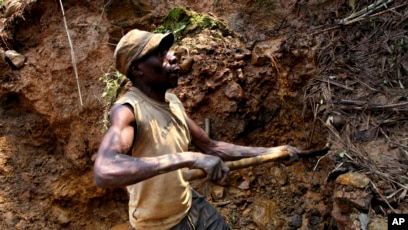By Chinasaokwu Helen Okoro
The governor of South Kivu province in eastern Congo on Friday ordered the suspension of all mining activities to “restore order” in the mineral-rich region, which is plagued by violence from armed groups.
Mining activities are suspended until further notice because of “the disorder caused by mining operators,” Governor Jean-Jacques Purusi Sadiki said in a statement, without providing details.
The statement said the aim of the decision was to “restore order to mining throughout the province and to preserve not only human lives, but also the traceability of mineral production in these sites.”
The local authorities gave 72 hours to “all mining companies, businesses and cooperatives to leave the sites and places of exploitation,” the statement added.
It was difficult to immediately assess whether the decision would be respected, as certain mining areas are under the control or influence of armed groups. It was also difficult to immediately assess the impact of this decision at the economic level. Thousands of residents of this gold- and coltan-rich province depend directly or indirectly on mining.
Many Chinese companies mine gold and other minerals in South Kivu, one of the eastern provinces of the Democratic Republic of the Congo that have been plagued by violence from armed groups for nearly three decades. In recent months, as the military battled the militias, the security situation has worsened.
Attacks on quarries and mining cooperatives are frequent in the region as more than 120 armed groups compete for land and resources in eastern Congo. Earlier this month, a militia attack on a gold mine in Ituri province in northeastern Congo killed six Chinese miners and two Congolese soldiers.
In August 2021, the former governor of South Kivu decided to “restore order” in the territory of Mwenga, about 100 kilometers from Bukavu, the capital of the province, and ordered the suspension of mining activities of six Chinese mining companies. He justified the decision as protecting “the interests of the local population and the environment.”
But following political pressure,the measure was subsequently lifted. A parliamentary commission of inquiry was launched, but its conclusions were never published.
At the time, the government said it was working to secure better terms on a $6.2 billion mining contract with China, which authorities say has not been profitable enough for the Central African nation since the deal was signed in 2008.
The opacity of the exploitation and sale of Congolese gold is regularly deplored. In its multiple reports, a U.N. group of experts said that “volumes of smuggled gold [are] significantly higher than those legally marketed.”
Bienvenu Mapendo, president of the Federation of Congolese Enterprises in the province of South Kivu, told The Associated Press that this decision would hurt the economy in the province.
“It is certain that the decision will have a negative impact in the province with all the communities that make a living from mining activities,” he said over the phone. “We would like to have a meeting with the provincial authority to find out the motivations for this decision.”


